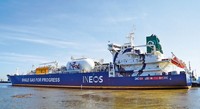Advertisement
Grab your lab coat. Let's get started
Welcome!
Welcome!
Create an account below to get 6 C&EN articles per month, receive newsletters and more - all free.
It seems this is your first time logging in online. Please enter the following information to continue.
As an ACS member you automatically get access to this site. All we need is few more details to create your reading experience.
Not you? Sign in with a different account.
Not you? Sign in with a different account.
ERROR 1
ERROR 1
ERROR 2
ERROR 2
ERROR 2
ERROR 2
ERROR 2
Password and Confirm password must match.
If you have an ACS member number, please enter it here so we can link this account to your membership. (optional)
ERROR 2
ACS values your privacy. By submitting your information, you are gaining access to C&EN and subscribing to our weekly newsletter. We use the information you provide to make your reading experience better, and we will never sell your data to third party members.
Business
Europe: Tougher times ahead as offshore competition nears
by Alex Scott
January 13, 2014
| A version of this story appeared in
Volume 92, Issue 2

COVER STORY
Europe Tougher times ahead as offshore competition nears
Europe’s chemical sector emerged from a long-term recession in the second and third quarters of 2013—the latest periods for which data are available–with a slight uplift in chemical sales, says CEFIC, Europe’s leading chemical industry association. It’s a bit of good news for a beleaguered region, but some industry leaders believe that even this small improvement could be short-lived.
Sales by Germany’s chemical industry, the largest among European countries, grew 0.5% to $256 billion in 2013 and are set to increase another 1.5% in 2014, according to VCI, the German chemical industry association. And the expectation is that U.K. manufacturing output, including chemicals, also will grow for at least the first three months of 2014, according to a survey of industry leaders by the Confederation of British Industry.
But European chemical firms have a relatively high cost base that needs to be addressed in light of strengthening international competition, experts say. Europe’s chemical sector has “structural issues,” including relatively high energy and feedstock costs, BASF Chairman Kurt Bock told journalists at a recent briefing.
Hendrik Disteldorf, principal with consulting firm A.T. Kearney, sees trouble ahead. “Europe is likely to come under significant pressure as exports from North America and the Middle East focus increasingly on this market,” he says. “Large-scale naphtha crackers in Europe, which provide the building blocks of many derivative chains, will face financial pressures, and significant closures are inevitable.” An increase in chemical consumption in Europe could absorb some of the supply and stave off wholesale plant closures, Disteldorf adds.
Ineos, one of Europe’s cracker operators, is seeking to insulate itself against competition outside Europe by importing ethane from the U.S. to feed its cracker in Grangemouth, Scotland. The firm plans to build a $500 million terminal in Grangemouth to bring in the cheap feedstock starting in 2016.
An additional problem is that European chemical firms collectively borrowed heavily in recent years to finance acquisitions. Repayments on loans totaling $76 billion will be due within the next few years, Disteldorf notes. “Refinancing will need to take place in the context of oversupply and asset rationalization,” he says. “The knock-on effect for cracker derivatives will also put pressure on the industry to restructure.”



Join the conversation
Contact the reporter
Submit a Letter to the Editor for publication
Engage with us on Twitter